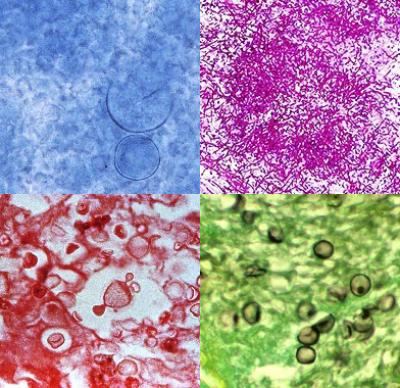
A collage of histological images of fungal diseases
Fungi are everywhere. Most fungi are not dangerous, but some types can be harmful to health, and people with deficient immune systems are more vulnerable to symptomatic infection. NIAID researchers are exploring how fungal susceptibility and infection impact the function of immune cells.
Current Clinical Research Studies Seeking Volunteers
The following are selected clinical trials supported by NIAID and investigating various aspects of fungal disease. The links lead to full study descriptions, eligibility criteria and contact information.
Pathogenesis and Genetics of Disseminated or Refractory Coccidioidomycosis
Researchers want to study the immune systems of people with disseminated coccidioidomycosis (DCM) or refractory coccidioidomycosis (RCM) to learn more about the disease and the best ways to treat it. People over the age of 2 years with DCM or RCM may be eligible to participate.
Study number: NCT02190266
New Techniques for Using a Saline Wash as a Diagnostic Tool for Pneumocystis Pneumonia
This study is designed to collect respiratory secretion specimens and blood samples to facilitate studies of human pneumocystis infection and disease, to detect genes associated with drug resistance, and to assess strain variation. People ages 3 to 99 years who are immunosuppressed with acute pneumonia and their families may be eligible to participate.
Study number: NCT00342589
Etiology, Pathogenesis, and Natural History of Idiopathic CD4+ Lymphocytopenia
The primary objective of this study is to further characterize the natural history of idiopathic CD4+ lymphocytopenia (ICL) while also investigating the genetic, environmental, and immunologic features of the condition. ICL patients ages 18 years and up may be eligible to participate along with their blood relatives and household contacts.
Study number: NCT00867269
Studies of Disorders With Increased Susceptibility to Fungal Infections
The objective of this study is to collect blood and other biological samples to study immune disorders that make individuals more susceptible to fungal infections. Patients with abnormalities of immune function as manifested by recurrent or unusual fungal infections, recurrent or chronic inflammation, or previous laboratory evidence of immune dysfunction are eligible for screening and assessment under this protocol.
Study number: NCT12222741
Evaluation and Follow-up of Patients With Cryptococcosis
This 5-year study follows the course of disease in previously healthy patients with cryptococcosis who developed the disease for no identifiable reason. Individuals with a positive culture of Cryptococcus neoformans who are 18 years of age and older without HIV infection or other condition predisposing to cryptococcosis (such as high-dose corticosteroid therapy, sarcoidosis, or a blood cancer) may be eligible to participate.
Study number: NCT00001352
Natural History of Individuals With Immune System Problems That Lead to Fungal Infections
This study collects medical information and samples for a long-term study of people with immune system problems that lead to fungal infections. People with a history of fungal infections caused by immune system problems and their family members may be eligible to participate.
Study number: NCT01386437

